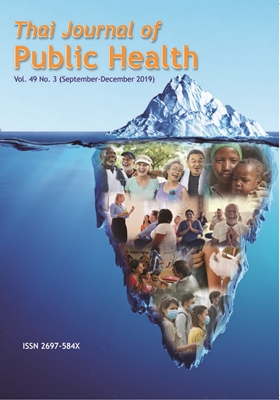Ergonomic Risk Factors Associated with Musculoskeletal Disorders among Physical Therapists at Community Hospitals in Health Region 1
Keywords:
musculoskeletal disorders, physical therapist, ergonomic risk factors, awkward postureAbstract
Physical therapists (PTs) are at risk of musculoskeletal disorders due to their strenuous working characteristics. This cross-sectional descriptive research aimed to explore ergonomic risk factors associated with musculoskeletal disorders among PTs. Study participants comprised of 207 PTs working at community hospitals in Health Region 1. The research instrument used was a self-administered questionnaire covering 3 parts; demographic information, musculoskeletal problems and ergonomic risk factors. Data were analyzed using descriptive statistics and the chi-square test. Results showed that the prevalence rates of musculoskeletal disorders among PTs were 95.7 and 82.1% during a 12-month and 7-day period, respectively. The 3 body areas having the highest percentage of musculoskeletal problems were the shoulders, lower back and neck at 72.5, 58.9, and 56.5%, respectively. Regarding the relationship between exposure to ergonomic risk factors and musculoskeletal disorders in the past 12 months, exposure to awkward postures, repetition and forceful exertion were significantly associated with musculoskeletal disorders at p<0.05. Findings from this study could be used as significant guideline initiation for treatment plans or intervention programs to prevent and reduce the occurrence of musculoskeletal disorders among PTs in community hospitals.
Downloads
Published
Issue
Section
License
Creative Commons License CC-BY-ND


